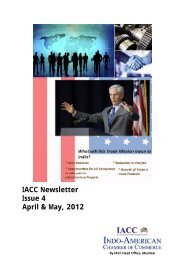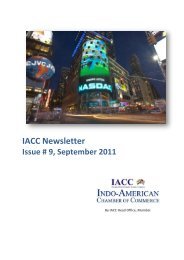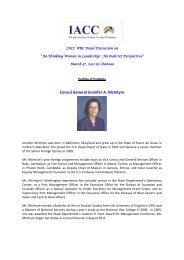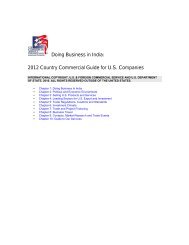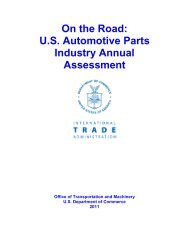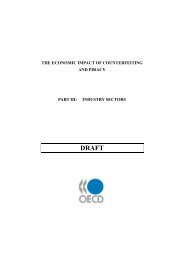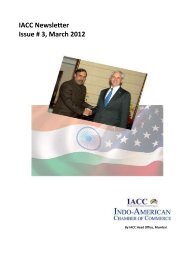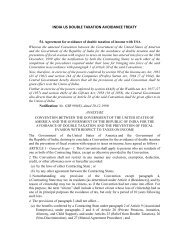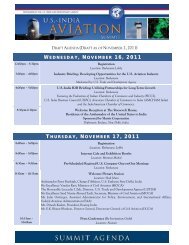Importing into the United States - Indo-American Chamber Of ...
Importing into the United States - Indo-American Chamber Of ...
Importing into the United States - Indo-American Chamber Of ...
Create successful ePaper yourself
Turn your PDF publications into a flip-book with our unique Google optimized e-Paper software.
Importers should be advised that once <strong>the</strong><br />
USTR has taken a Section 301 action, U.S. Customs<br />
is responsible for implementing <strong>the</strong> action<br />
as directed by USTR.<br />
Information on USTR actions that U.S.<br />
Customs is currently implementing is located<br />
at <strong>the</strong> following Internet address:<br />
http://www.customs.treas.gov/impoexpo/ustract.htm.<br />
38. ALCOHOLIC BEVERAGES<br />
Any person or firm wishing to engage in<br />
<strong>the</strong> business of importing distilled spirits,<br />
wines, or malt beverages <strong>into</strong> <strong>the</strong> <strong>United</strong> <strong>States</strong><br />
must first obtain an importer’s basic permit<br />
from <strong>the</strong> Bureau of Alcohol, Tobacco and<br />
Firearms, Department of <strong>the</strong> Treasury, Washington,<br />
DC 20226, Tel. 202.927.8110. That<br />
agency is responsible for administering <strong>the</strong><br />
Federal Alcohol Administration Act.<br />
Distilled spirits imported in bulk containers<br />
of a capacity of more than one gallon<br />
may be withdrawn from Customs custody only<br />
by persons to whom it is lawful to sell or o<strong>the</strong>rwise<br />
dispose of distilled spirits in bulk. Bulk or<br />
bottled shipments of imported spirits or distilled<br />
or <strong>into</strong>xicating liquors must, at <strong>the</strong> time<br />
of importation, be accompanied by a copy of a<br />
bill of lading or o<strong>the</strong>r documents such as an<br />
invoice, showing <strong>the</strong> name of <strong>the</strong> consignee,<br />
<strong>the</strong> nature of its contents, and <strong>the</strong> quantity contained<br />
<strong>the</strong>rein (18 U.S.C. 1263).<br />
U.S. Customs will not release alcoholic beverages<br />
destined to any state for use in violation of its<br />
laws, and <strong>the</strong> importation of alcoholic beverages in<br />
<strong>the</strong> mails is prohibited.<br />
The <strong>United</strong> <strong>States</strong> adopted <strong>the</strong> metric<br />
system of measurement with <strong>the</strong> enactment of<br />
<strong>the</strong> Metric Conversion Act of 1975. In general,<br />
imported wine must conform with <strong>the</strong> metric<br />
standards of fill if bottled or packed on or after<br />
January 1, 1979. Imported distilled spirits, with<br />
some exceptions, must conform with <strong>the</strong> metric<br />
standards of fill if bottled or packed on or after<br />
January 1, 1980. Distilled spirits and wines bottled<br />
or packed prior to <strong>the</strong>se respective dates<br />
must be accompanied by a statement to that<br />
effect signed by a duly authorized official of<br />
<strong>the</strong> appropriate foreign country. This statement<br />
may be a separate document or may be shown<br />
on <strong>the</strong> invoice. Malt beverages including beer<br />
are not subject to metric standards of fill.<br />
MARKING<br />
Imported wines in bottles and o<strong>the</strong>r containers<br />
are required to be packaged, marked,<br />
branded, and labeled in accordance with <strong>the</strong><br />
regulations in 27 CFR Part 4. Imported malt<br />
beverages, including alcohol-free and nonalcoholic<br />
malt beverages, are also required to be<br />
labeled in conformance with <strong>the</strong> regulations in<br />
27 CFR Part 7. The labeling regulations governing<br />
imported distilled spirits can be found<br />
in 27 CFR Part 5.<br />
Each bottle, cask or o<strong>the</strong>r immediate container<br />
of imported distilled spirits, wines, or<br />
malt beverages must be marked for Customs<br />
purposes to indicate <strong>the</strong> country of origin of<br />
<strong>the</strong> alcoholic beverage contained <strong>the</strong>rein, unless<br />
<strong>the</strong> shipment comes within one of <strong>the</strong> exceptions<br />
outlined in Chapter 32 of this book.<br />
CERTIFICATE OF LABEL<br />
APPROVAL<br />
Labels affixed to bottles of imported distilled<br />
spirits, wine and malt beverages must be<br />
covered by certificates of label approval issued<br />
to <strong>the</strong> importer by <strong>the</strong> Bureau of Alcohol,<br />
Tobacco and Firearms. Certificates of label<br />
approval or photostatic copies must be filed<br />
with Customs before <strong>the</strong> goods may be<br />
released for sale in <strong>the</strong> <strong>United</strong> <strong>States</strong>.<br />
Certificate-of-label approval requirements must<br />
also be met for fermented malt beverages if<br />
similar to <strong>the</strong> federal requirements (27 CFR<br />
Parts 4, 5 and 7).<br />
IMPORTING INTO THE UNITED STATES<br />
85



